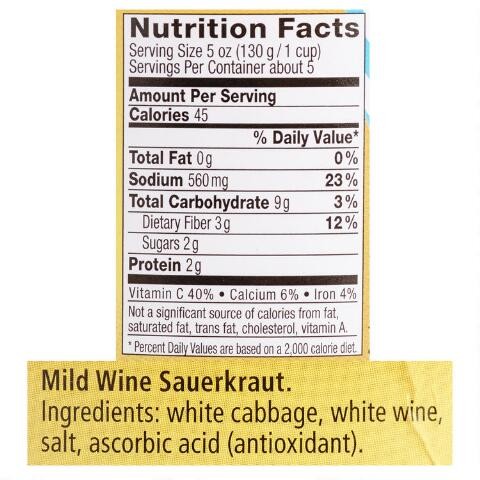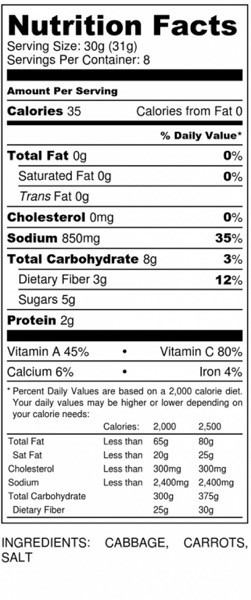Love it or hate it, sauerkraut and other fermented vegetables are yummy! Yes, I said it… I love sauerkraut and all kinds of fermented vegetables, but are they keto friendly?
Sauerkraut, which is generally fermented cabbage and salt, can be eaten while following a keto diet. Sauerkraut may also offer various health benefits, such as a boosted immune system and improved digestion. On average, sauerkraut has between 1 and 3 grams of net carbs per cup.
In this article, I'll cover whether you can eat ALL sauerkraut on a keto diet, such as store-bought sauerkraut, how many carbs are in sauerkraut, the benefits, and much more.

Table of Contents
Can You Eat Sauerkraut On Keto?
Sauerkraut, aka “sour cabbage,” is perfectly acceptable to eat while following a ketogenic diet. Traditional sauerkraut should only be using two, maybe three ingredients, and those are:
- Finely shredded cabbage
- Salt
- Water *
Since cabbage is allowed on a ketogenic diet, sauerkraut is naturally also keto-friendly. Cabbage mainly consists of water and fiber, leaving very few net carbohydrates that would prevent or knock you out of ketosis.
Is Store Bought Sauerkraut keto?
While sauerkraut, for the most part, is keto friendly, some store-bought sauerkraut may not be.
Most companies make sauerkraut the traditional way, with very few added ingredients, but there are plenty of specialty companies that may try to add a little flair of their own.
To be 100% sure, make sure you check the nutrition label of the particular brand you plan to purchase.
Certain brands, like the example below, like to include white wine. You may find some that have added sugars in the fermenting process as well.

Other brands may add in other vegetables, such as shredded carrots, which raises the net carb count slightly. However, carrots and even sauerkraut with carrots may be eaten in moderation.

Simply be mindful of the nutrition label and make sure to track the net carbs to ensure you stay below your daily threshold.
How Many Carbs Are In Sauerkraut?
So how many carbs are in sauerkraut, you ask?
Labels always vary on the number of carbohydrates, even with the same ingredients and serving size.
In general, most brands have between one and three grams of net carbs per serving.According to nutrition data from Self, which has a sizeable nutritional database of popular foods, one-cup of sauerkraut has a total of 6.6 grams of carbohydrates.
4.1 grams of those carbs come from dietary fiber, making for a total of 2.5 grams of net carbs for a one-cup (142g) serving.
As you see, you can eat a large volume of sauerkraut for a relatively small amount of calories and carbohydrates.
How Sauerkraut Is Made
Traditional sauerkraut is made through a pickling process referred to as lactic acid fermentation.
Finely shredded cabbage is layered with salt and left to ferment, typically at room temperature.
How long you ferment sauerkraut is entirely up to you. Generally, you would just ferment the sauerkraut until you like the taste and texture of your sauerkraut.
On average, people will ferment their sauerkraut between one and three weeks, so it does take a little patience if you are planning to whip up a batch of your own.
They say the best quality sauerkraut is fermented for a MINIMUM of 20 days, so it's probably best to make multiple batches, so you have some more for when one begins to run out.
It should also be noted that the longer you ferment your cabbage, the fewer carbohydrates it will have, and that's because the fermentation process “consumes” the sugars.
So yes, longer is better, especially for a ketogenic diet.
Is Sauerkraut Healthy?
Probiotics are popular in the health space, and this makes fermented foods like sauerkraut and kimchi a “healthy” food.
Sauerkraut is RICH in probiotics, with some sources saying as much as 10 trillion bacteria in one serving size.
What do you mean, bacteria? Well, probiotics are essentially live bacteria, but they're the “good” or “healthy” bacteria, and that's because they keep your gut healthy.
While sauerkraut has a good amount of nutrition on its own, many of the health benefits in sauerkraut stem from these probiotics.
Other great source of probiotics include kimchi and kefir, both of which are keto friendly.
What Are The Benefits Of Sauerkraut?
Probiotics, such as those found in sauerkraut, have shown promise for a variety of treatments.
Additionally, sauerkraut contains many nutrients. A one-cup serving of sauerkraut has:
- Vitamin C
- Vitamin K
- Iron
- Manganese
- Vitamin B6
- Folate
- Copper
- Potassium
Improves Social Anxiety
Probiotics have shown promise in research as a potentially safe supplement compared to more traditional medications. Although more research is needed to make any conclusive claims.1
Improves Digestion
Most people are familiar with probiotic supplements for use with helping improve digestion and overall health.2 3
Studies also show that probiotics may help reduce constipation and bloating, in addition to symptoms linked with ulcerative colitis. 4 5
Boosts Immune System
Probiotics in sauerkraut help to improve and balance out the bacteria in your gut, which helps prevent unwanted substances from leaking into other areas of your body and causing an immune response. 6 7
Many people may have heard the term “leaky gut.”
Also, consuming probiotic-rich foods like sauerkraut may reduce your risk of things like the common cold. 8
Sauerkraut is also rich in vitamin C and iron, both of which lead to a healthy immune system. 9
Helps Your Brain and Reduces Stress
A healthy gut flora with contributions from probiotic-rich foods such as sauerkraut may help reduce stress and maintain brain health. 10 11
Sauerkraut may also help the gut increase the absorption of minerals such as magnesium and zinc, both of which are considered mood-regulating minerals. 12
Will Sauerkraut Break A Fast?
Many people following a ketogenic diet stumble upon both intermittent fasting and possibly graduate up to multiple days fasting.
However, when it comes to weight loss, there's no evidence to support that intermittent fasting is superior for weight loss when protein and calories are equated for. 13
If you are using IF because it allows you to adhere to your diet better, then keep doing what you are doing.
If a little sauerkraut during your fasting window keeps you satiated until your first meal, then it won't make much of a difference for weight loss.
That is, so long as your total daily food intake remains the same.
If you are fasting for reasons other than weight loss, such as autophagy and other health benefits, then you shouldn't be eating sauerkraut during this period.
Keto-Friendly Sauerkraut Ideas Or Recipes
So what else can you dow with sauerkraut while following a ketogenic diet? Tons!
Here are a few keto friendly sauerkraut ideas and recipes for you to try out.
Polish sausage and sauerkraut
I like to mix up some sauerkraut and polish sausages together in a cast-iron skillet. If you have a local Costco, I like to pick up the Teton waters grass-fed polish sausages, but any polish sausage should work here.
If you want, use a keto-friendly hot dog bun like these ThinSlim Hot Dog Buns.
Add it to soups
Take your favorite keto friendly soup recipe and mix in some sauerkraut for a tangy crunch.
It may sound a little weird, but I like to mix in some sauerkraut into my beanies chili. If you have an instant pot, you can make a week's worth of chili in ~30 minutes.
In a casserole
Probably my absolute most favorite way of using sauerkraut is in a “casserole.”
Instead of eating the polish sausage whole, I chop it up into bite-size pieces and stir fry it with pork or turkey bacon and sauerkraut. At the very end, I like to melt some cheese, especially some Dubliner Irish cheddar… but whatever cheese you prefer will work too.
The Takeaway
Sauerkraut is not only keto friendly but quite healthy due to the plethora of probiotics it contains.
If buying store-bought sauerkraut, do a double-check at the nutrition label and make sure there are no added sugars. For the most part, sauerkraut should be only cabbage and salt.
